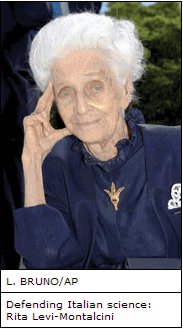|
|
|
|
|
|
|
News & Views item - November 2006 |
![]() 97 Not Out and Still Scoring Runs for Science. (November 23, 2006)
97 Not Out and Still Scoring Runs for Science. (November 23, 2006)
1986 co-recipient of the Nobel Prize for the discovery of
growth factors Rita Levi-Montalcini now 97 and an Italian "Senator for Life" is
still very much making her presence felt in Italian science policy when she sees that matters ought to be put right.
policy when she sees that matters ought to be put right.
During the debate in the Senate, Senator Levi-Montalcini put the point, "Italy is poor in raw material but rich in human capital. If it's destroyed, Italy can't help but sink," and informed Italian Prime Minister Romano Prodi that she would vote against the new government's 2007 budget if last-minute cutbacks for science were not reversed.
Prodi buckled and the bill passed through the first of the Italian parliament's two chambers on November 18 with a final budget for universities and research only slightly lower than that for this year.
According to Nature's Alison Abbott, "[W]hen the stringent 2007 budget — designed to reduce Italy's soaring deficit — is finally signed off in December, scientists are likely to see a significant increase in research project money, a decrease in funding for infrastructure, and a smaller-than-anticipated increase in new positions for young academics," and while the research community might have wished for more, Prodi's government is a fresh wind of change beginning to reverse the years of repeated cuts issued by the Berlusconi government.
Nevertheless, Prodi has has to retreat from the extravagant election promise to hike research spending from the current level of 1.1% of GDP to 3% by 2010 which would have put Italy in line with European Union (E.U.) stated goals for creating a knowledge economy. The chief of the university and research ministry, Fabio Mussi, has now set his sights lower to reach "1.5% within 5 years."
There are also significant changes which are likely to have profound effects on Italian academe and research over the coming years as a result of two governmental degrees which have just been come into effect.
The first creates an evaluation agency for universities and research which will be in effect a research quality framework.
Abbott reports its effect will be, "to broadly grade universities on their performance in teaching and research, producing three or four groupings that the ministry for universities and research will eventually use to allocate funds. 'The agency's aim is to gradually improve, not to judge,' says Luciano Modica, the research ministry's undersecretary."
Modica also hope that the infamous dishonest hiring policies practiced by Italy's universities will be curbed because the evaluation system could threaten to expose them.
Even more dramatic is likely to be the forthcoming radical changes to the selection procedures for presidents of research organizations. Previously direct political appointments, they were considered political plums given by the government of the day. The second of the two decrees is designed to implement independent committees which will prepare shortlists of three candidates from which the research minister must pick.
Meanwhile in Japan the newly installed government of Shinzo Abe is beginning to make changes in Japan's science policies. One of the most stultifying state of affairs in its universities is the effect of élite professors sitting at the top of a rigid hierarchy while junior colleagues "paw the ground" waiting their chance for promotion.
Another problem is that the setting of project priorities tends to have the heavy-handed input from both Japan's politicians and civil servants with insufficient scientific consultation.
Coinciding with Abe's taking over the prime ministership, enough of the costly research projects are winding down which allows him to institute a long-term review of Japan's science and technology needs through 2025. To assist him he made the radical decision to appoint a scientist, Kiyoshi Kurokawa, as a special adviser to the cabinet.
Kurokawa, a medical graduate of the University of Tokyo, moved in 1969 to University of Pennsylvania School of Medicine (as a fellow in biochemistry), after which he had appointments UCLA, USC, and then back to the UCLA School of Medicine where he became Professor of Medicine and Chief, of the Division of Nephrology. He returned to the University of Tokyo Faculty of Medicine in 1984, and assumed Professor and Chair of the Department of Medicine in 1990. He became Dean of Tokai University School of Medicine in 1997.
In it's November 23, 2006 editorial Nature waxes optimistically,
"Kurokawa... has the contacts and experience to lend valuable impetus to
Japanese science policy. As a former president of the Science Council of Japan,
which represents 790,000 Japanese scientists, he has not been afraid to speak
out on scientific issues in the past, and has a broad grasp of the strengths and
weaknesses of Japanese science."